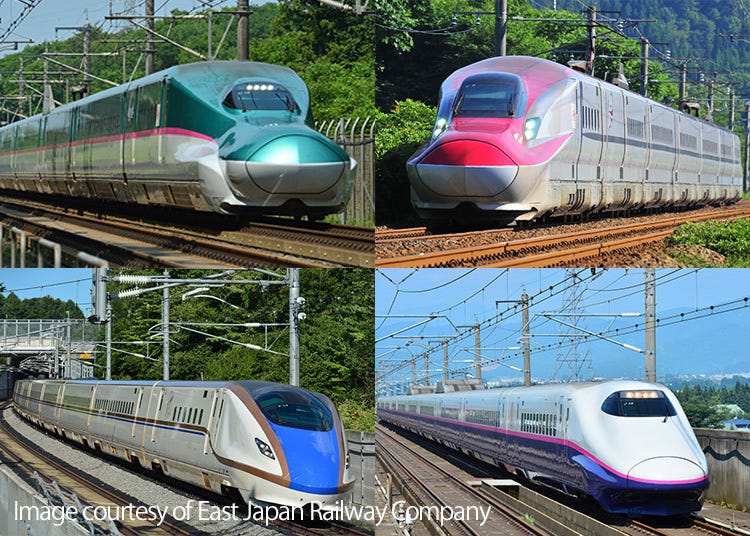
Japan's railway "free passes" are great tools to keep costs low when traveling by train. If you're traveling through eastern Japan, you won't want to miss out on the JR EAST PASS: a pass created specifically for international travelers and expatriates.
The JR EAST PASS gets you five days of unlimited access to local lines and even the Shinkansen. Depending on how you use it, it could even save you over 50,000 yen (about 500 USD)! And because it's available to expatriates in addition to international travelers, it's easy to put together trips in Japan with entire families or groups of friends.
Read on to learn about where the JR EAST PASS can be used and how to buy one. They're easier to use than ever before!
Useful, economical key to traveling around eastern Japan! Learn all about the JR EAST PASS

The JR EAST PASS is the collective name for two "free passes" you can use on East Japan Railway lines that link areas in eastern Japan. Two types are available for two of the core regions: one for the Tohoku area and one for the Nagano, Niigata area.
Both are available for use by expatriates, a very gratifying feature. It makes it that much easier to vacation with family or friends visiting Japan, or family and friends living in Japan—so long as they have a non-Japanese passport.
JR EAST PASS (Tohoku area)
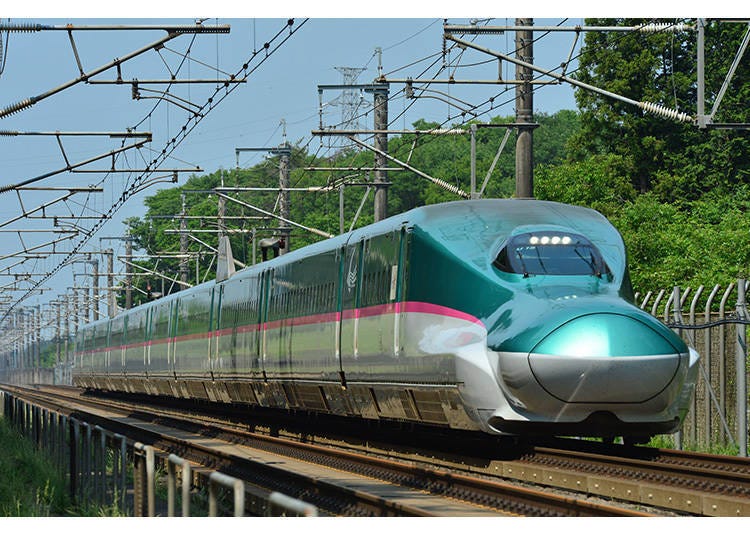
■Cost
・Adults (Ages 12 and up): 20,000 yen
・Children (Ages 6 to 11): 10,000 yen
・Free for children 5 and under
■Usage Period
Five consecutive days
■Usage Area

JR EAST PASS (Nagano, Niigata area)
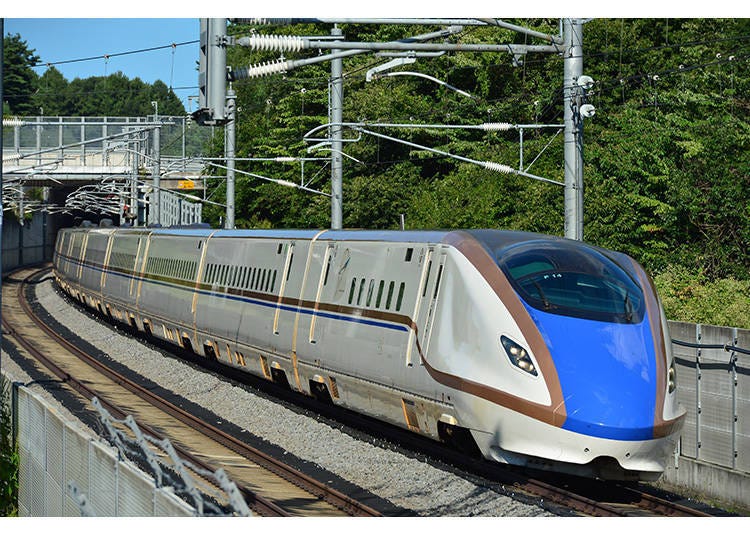
■Cost
・Adults (Ages 12 and up): 18,000 yen
・Children (Ages 6 to 11): 9,000 yen
・Free for children 5 and under
■Usage Period
Five consecutive days
■Usage Area
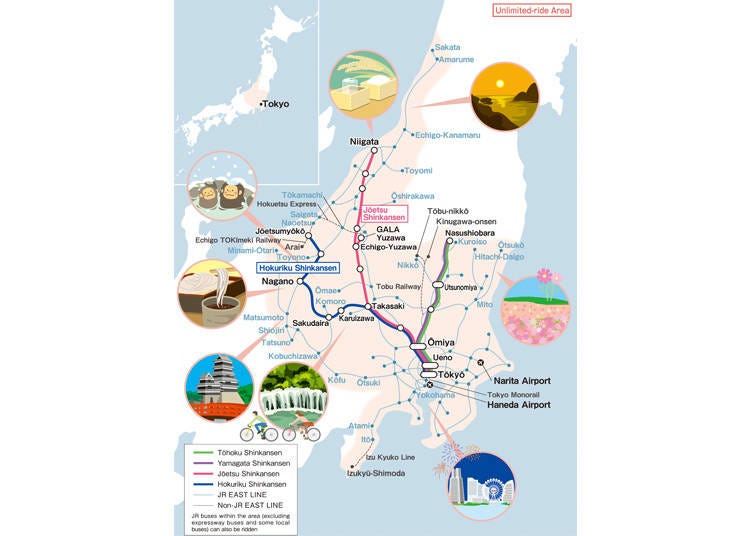
Tips for using the JR EAST PASS with family
JR EAST PASS costs less for children (6 to 11), and is free for children five and under. The children's pass (6 to 11) can also be used to reserve seats.
You can still reserve a seat for a child five or under if you instead pay the reduced price for a child's (6 to 11) JR EAST PASS.

How much money can JR EAST PASS save you? We compare with regular ticket prices
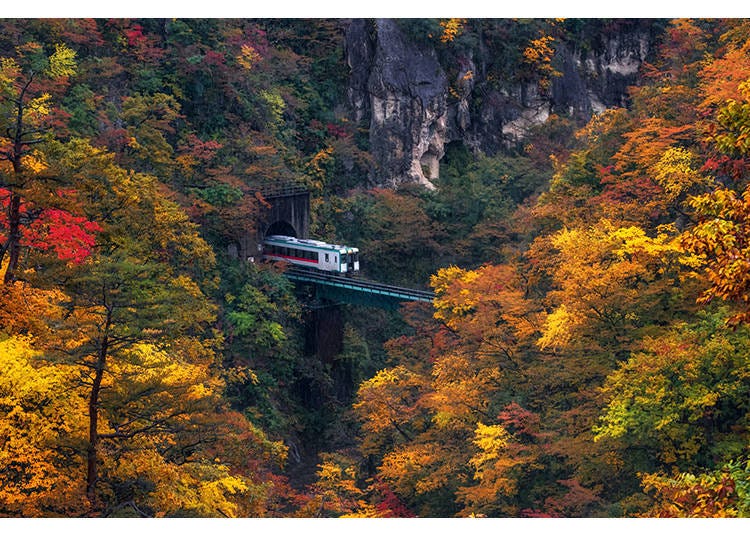
To figure out how much a JR EAST PASS can save you, let's compare a trip for a family of two adults and two children (6-11).
For this, we assumed reserved seats on ordinary Shinkansen cars during a regular period; note that reserved seating prices can change depending on the time of year. Confirm with a reservation site for details.
(*Non-pass prices are reference prices; all are subject to change.)
Using a JR EAST PASS (Tohoku area)
・ Using a pass, it costs a total of:
60,000 yen (40,000 for two adults and 20,000 for two children)
・ Without a pass, it costs a total of:
Example 1. Shinkansen round-trip from Tokyo to Sendai
~68,500 yen (~45,500 yen for two adults and ~23,000 for two children)
Example 2. Shinkansen round-trip from Tokyo to Sendai to Akita
~120,000 yen
・Tokyo to Sendai: ~34,500 yen (~23,000 for two adults, ~11,500 for two children)
・Sendai to Akita: ~31,500 yen (~21,000 for two adults, ~10,500 for two children)
・Akita to Tokyo: ~54,000 yen (~36,000 for two adults, ~18,000 for two children)
Using a JR EAST PASS (Nagano, Niigata area)
・ Using a pass, it costs a total of:
54,000 yen (36,000 for two adults, 18,000 for two children)
・ Without a pass, it costs a total of:
Example 1: Shinkansen round-trip from Tokyo to Niigata
~64,500 yen (~43,000 for two adults, ~21,500 for two children)
Example 2. Shinkansen round-trip from Tokyo to Nagano to Niigata
~97,000 yen
・Tokyo to Nagano: ~25,500 yen (~16,500 for two adults, ~8,500 for two children)
・Nagano to Niigata: ~39,500 yen (~26,500 for two adults, ~13,000 for two children)
・Niigata to Tokyo: ~32,500 yen (~21,500 for two adults, ~11,000 for two children)
Depending on how you use them, either pass can save you money even visiting one location. When you add one or more destinations, the savings pile up quickly: in the above example, around 40,000 yen with the Nagano / Niigata area pass and around 60,000 yen with the Tohoku area pass. And that’s not even including usage of local lines over those five days! With a rail pass this useful, giving you unlimited access to transportation over five days, there’s no not using it.
The JR-EAST Train Reservation website makes buying a JR EAST PASS easy!
East Japan Railway Company’s international reservation website, JR-EAST Train Reservation, has been rebuilt and is now easier than ever to use.
The largest change is the new ability for people to purchase JR EAST PASS and other passes aimed at international travelers and expatriates over the internet.
The website also newly supports nine languages. In addition to continued support for English, Chinese (Simplified and Traditional), and Korean, it now supports Thai, Indonesian, French, German, and Spanish, so that more people can comfortably make purchases in their own languages.

Even on day one of your trip, you can purchase a JR EAST PASS stress-free!
Getting your JR EAST PASS has also become easier too. If you have a non-Japanese passport, you can scan it at a reserved seat ticket vending machine to pick up a JR EAST PASS you have purchased via the JR-EAST Train Reservation site—or buy one then and there.
Just bring your passport to a reserved seat ticket vending machine equipped with a passport reader, scan your passport, and follow directions to get your JR EAST PASS.
Reserved seat ticket vending machines with a passport reader can be found at Shinkansen stops like Tokyo Station and Ueno Station, and also major hubs like Shinjuku, Shibuya, and Ikebukuro. Check below for more information on where these reserved seat ticket vending machines are and how to use them.

Another new feature: JR EAST PASS is compatible with automatic ticket gates at stations. In the past, pass-holders had to check with station employees to enter or exit stations. Now, you can walk on through the automatic ticket gates to board or disembark, heading for your destination with no stress.
Trains are perhaps the best way to get around eastern Japan's spacious and mountainous prefectures. Just one JR EAST PASS, available to anyone with a non-Japan passport, can help you visit this incredible area with ease. Use it to spend an enjoyable five full days around eastern Japan with family or friends!
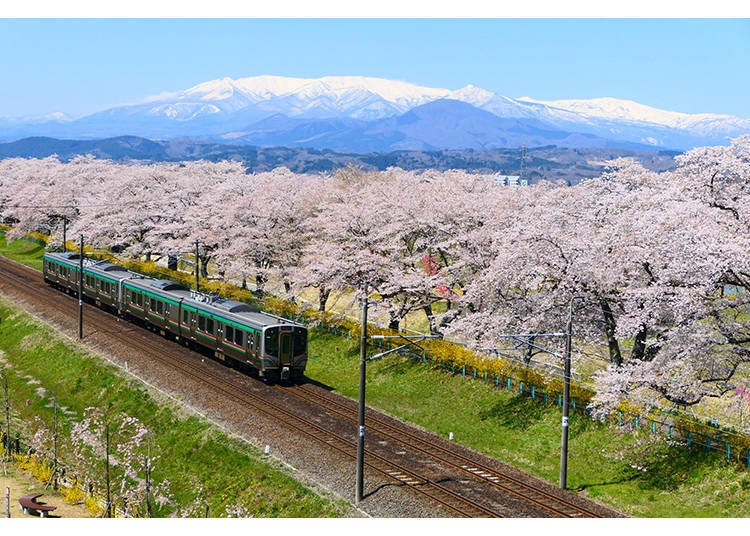
*Prices and options mentioned are subject to change.
*Unless stated otherwise, all prices include tax.
Popular Tours & Activitiess
-
Ad

Why Fukushima is the Next Big Food Destination in Japan The Foodie Paradise Only 90 Minutes from Tokyo
-
Ad

Scandinavian Brands Meet Harajuku: Inside Japan's Only Flagship Stores for Haglöfs and D_b_
-

Aomori's Quiet Side in Autumn: 5 Scenic Spots in Hachinohe According to a Local
by: Marco Blasco
-

Niigata Sake no Jin 2026: Guide to Japan's Most Legendary Sake Weekend
-
Ad

Explore Snow Country from Echigo-Yuzawa Station: A Year-Round Guide to Ski Resorts, Art, and Regional Travel
-
Ad

Discover Kanazawa: History, Culture, and How to Get Around with Ease
-

Exploring Exceptional Niigata Sake at Famed Imayo Tsukasa Shuzo Sake Brewery
-

Koiwai Farm Guide: Explore, Dine, and Play at Iwate's Top Agritourism Spot
-
Ad

Now in 9 Languages! 3 Reasons Why JR East's Website is Super Useful & Convenient
-

Odate City, Akita: Where Northern Japanese Traditions Come to Life
-

What to Pack for Japan: 8 Essential Things for a Hassle-Free Trip
-

10 Important Japanese Phrases to Know Before You Enter a Japanese Convenience Store
by: Teni Wada












